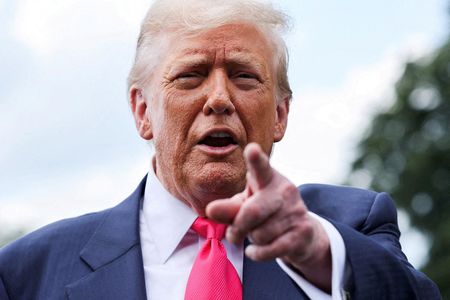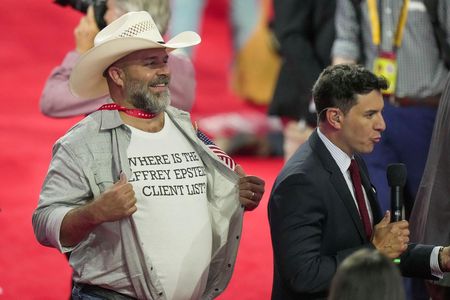Republicans in Congress handed President Trump a win by passing his rescissions request to claw back $9 billion in already approved spending. That includes funding for foreign aid and public broadcasting. The panel discusses what comes next from the administration.
Clip: How Trump's funding clawback was a test case for future cuts
Jul. 18, 2025 AT 8:56 p.m. EDT
TRANSCRIPT
Notice: Transcripts are machine and human generated and lightly edited for accuracy. They may contain errors.
Jeffrey Goldberg: Remember way back when Donald Trump argued that Barack Obama was born in Kenya, and remember not so way back when Trump told us the Democrats and the deep state stole the 2020 election? Perhaps the lesson this week is live by conspiracy theories, die by conspiracy theories.
Far be it for me to suggest that Trump is in political trouble, he is after all one of the luckiest men in the history of American politics, but this has been a stressful week in MAGA land. It is also undoubtedly stressful and let's not forget this important point for the actual victims of Jeffrey Epstein's terrible crimes.
Tonight, we'll talk about the relationship between Trump and Epstein and about the consequences of this very strange episode.
Joining me tonight at the table, Leigh Ann Caldwell, the chief Washington correspondent at Puck, Stephen Hayes is the editor of The Dispatch, Meredith McGraw is a White House reporter for The Wall Street Journal, and Michael Shearer is a White House correspondent for The Atlantic.
Thank you all for joining me tonight. Before we get to this week's weird main event, I want to just talk for a minute about something that just happened in Congress. Congress has voted, narrowly voted, to claw back money that it had already budgeted for foreign aid, but for our purposes, I want to talk about something that directly affects us, the Corporation of Public Broadcasting, which provides funds for NPR and PBS, including this member station, WETA. And I wanted to start by just asking Leigh Ann how this all. happened and why it happened.
Leigh Ann Caldwell, Chief Washington Correspondent, Puck: So, the administration, of course, has been saying that they want to shrink the size of government, get rid of waste, fraud, and abuse. Another interpretation of what they want to do is actually just remake the country in their view, in their eyes. They --
Jeffrey Goldberg: A little project.
Leigh Ann Caldwell: A little project, which they're actually becoming quite successful at with all the things that they are doing.
Jeffrey Goldberg: Right.
Leigh Ann Caldwell: So, they picked the lowest hanging fruit, the things that are least controversial to try to claw back funding that Congress has already appropriated, just $9 billion. That is a fraction of the amount of money that Congress spends and the government spends every year.
Jeffrey Goldberg: By the way, just for everybody's clarity, only a billion of that was for public broadcasting.
Leigh Ann Caldwell: Correct. Most of the rest of it was for foreign aid and for programs overseas.
And so Republicans agreed to do it even though many Republicans were quite uncomfortable with it. Even very rural Republicans had some concerns about some of their rural constituencies not having access to emergency broadcast alert systems that come through PBS and NPR and some of the local entertainment and news information that they get and rely on in some of these rural places. But Donald Trump demanded it and wanted it, and it passed.
Jeffrey Goldberg: Right. Michael, the rescission process, you're fascinated by it. I know you are. Philosophically, I want to ask you all what this means. From our perspective, you know, obviously we're in the media and this is quite a historic moment. But talk about the use of rescission.
Michael Scherer, Staff Writer, The Atlantic: Yes. So, it's bad for the corporation, for broadcasting, but what I think will be remembered of this vote is that it was a test case in whether they could change the way the government appropriates money. Historically, when Republicans control the House and the Senate, you still need 60 votes to get a budget through the Senate, and that means you need a bipartisan process. In the past, it's meant that there's been deals where military gets this amount of money and social safety net gets this amount of money.
The Trump administration's goal here is to break that process and they are doing it by making it a purely partisan process. Rescission only needs 50 votes if you have the vice president, 51, otherwise. And so they're basically turning the appropriations or threatening to turn the appropriations process into a majority process in the Senate. And that's going to really complicate the whole way -- change dramatically the whole way the federal government's been budget for years.
For Republicans, you know, Russ Vought was out this week saying, we need a more partisan process.
Jeffrey Goldberg: The head of the OMB.
Michael Scherer: Yes, the head of the --
Jeffrey Goldberg: The chief budget officer of the government.
Michael Scherer: Their dream is that they, when they control the House and the Senate, that means they'll control how all the purse strings are set. They'll basically be able to cut Democrats out the process. We don't know if it's going to get there, but that was a big step they took this week.
Jeffrey Goldberg: Steve, I have to ask the obvious question, which is, what happens if they ever lose majority power? Do they then -- will they complain that the Democrats are using the same burn it all to the ground methodology that we're seeing right now?
Stephen Hayes, Editor, The Dispatch: Yes, undoubtedly. I mean, I don't think they operate --
Jeffrey Goldberg: But they're not planning for a Democrat --
Stephen Hayes: They don't operate -- no, I think from the perspective of most Republicans in both the Senate and the House, they think Democrats have been doing this all along. Democrats have been partisan. They've been maneuvering, they've been manipulating government in their favor for decades, and now it's our time as Republicans, as conservatives to come back and give them a little taste of their own medicine and not be so timid in taking the fight to Democrats on these issues.
I think the challenge for Republicans is, at some point, they won't be in power anymore and they will have to deal with this. And what will be their arguments? I mean, their small government arguments, I think, fall on deaf ears. That Republicans have been arguing to cut funding for public broadcasting, I think, with justification for decades.
But as Leigh Ann says, you know, you're talking about a billion dollars when you're running a $1.3 trillion deficit. I would say cut everything you can cut. We need to lower the $1.3 trillion deficit. But they can't really make credible small government arguments to do these things.
Jeffrey Goldberg: I just want you to note for the -- I want to note for the record that if you continue your opposition to CPB funding, I'm taking away that mug.
Stephen Hayes: I mean, I should say --
Jeffrey Goldberg: No more --
Stephen Hayes: I've held these views consistently for three decades, including the years that my wife worked for the Corporation for Public Broadcasting, but you can imagine led to some funny conversations around the kitchen table, yes.
FROM THIS EPISODE


Clip: Trump enraged by MAGA’s Epstein backlash


Full Episode: Washington Week with The Atlantic full episode, 7/18/25

© 1996 - 2026 WETA. All Rights Reserved.
PBS is a 501(c)(3) not-for-profit organization
